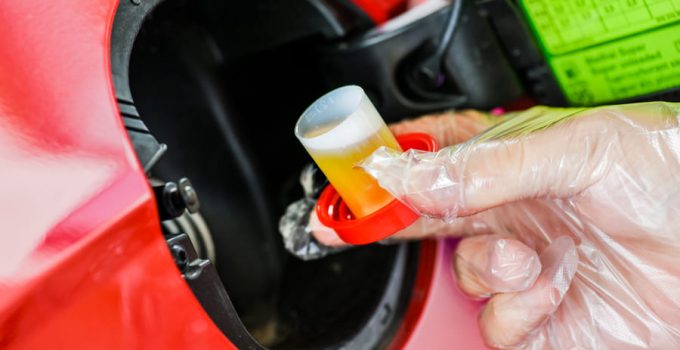
The most common additives for passenger cars include additives for your engine oil, coolant, transmission oil or fuel. These are not only available to buy individually as an add-on; some of these are already added to the operating fluids sold during production. These include, for example, diesel additives, which are contained in so-called winter diesel. These are already contained in the fuel and ensure that this fuel does not sludge and that it retains the necessary low viscosity even at cold outside temperatures. In addition, there are additives in modern fuels that keep your injectors clean, reducing the need for injector cleaning. The same applies to so-called oil additives, which can have a similar effect to an engine flush. What other benefits you can enjoy from additives, we will explain to you in the following article.
Contents
What function can additives have?
As already described, the range of additives is comparatively large. So it is hardly surprising that there are even agents that can be used for very special repairs. These include, for example, sealants for leaky cooling circuits. If you add such a coolant additive, make sure that it settles at the appropriate points so that the desired tightness can be restored. Other products for your cooling circuit also include special preservatives, for example, which are intended to ensure that no rust forms and no dirt can deposit. In addition, additives are also used in your cooling system to prevent your cooling circuit from freezing. Other areas of application include poor fuel quality, vehicles being shut down, oil loss, environmental protection, safety, low outside temperatures and a dirty vehicle engine.
Fuel additives – miracle cures or expensive placebos?

In addition to the additives for diesel already mentioned, there are also additives for your petrol. If you only read the descriptions of the manufacturers, it quickly becomes clear that it must only be a miracle cure. These should ensure that the use of your vehicle engine has almost no harmful effects. Not only should the wear and tear of the engine components be minimized, but they should also consume less fuel and emit less exhaust gas. Ultimately, you should even be able to remove dirt and deposits in the engine. As you may have noticed from this long list, it is highly doubtful that all of these statements are actually true. Nonetheless, there are some positive properties that often come at a high price.
Types of diesel fuel additives
Various additives are used to improve fuel properties – Chemicals that react with components in the fuel to stimulate or slow down various chemical processes. Additives are often complex and serve multiple purposes. Today the most popular are:
- Modifiers. They increase the cetane number. They reduce cold starts and reduce smoke development, which contributes to increased engine performance. Molecules of these products decompose, generating highly flammable free radicals that ignite the fuel. They are effective only in the initial phase of engine operation. These include Liqui Moly Systempflege Diesel, Wynns Diesel Cetane Plus, Wynns Supreme Diesel and Liqui Moly Super Diesel Additive.
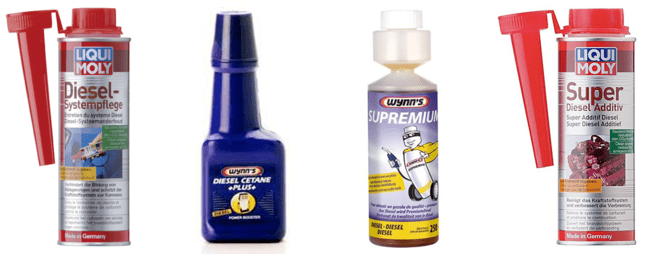
- Combustion Modifiers. These include anti-smoke, anti-sand and soot products. These products have a catalytic effect on the combustion of soot and change its structure. They reduce smoke development in the exhaust system, prevent engine and exhaust system wear and tear and prevent the particle filter from decomposing prematurely. The best-known products are: Liqui Moly Diesel Russ-Stop, Wynns Clean Burn Diesel, Marly Diesel Booster, Liqui Moly Super Diesel Additive and others.
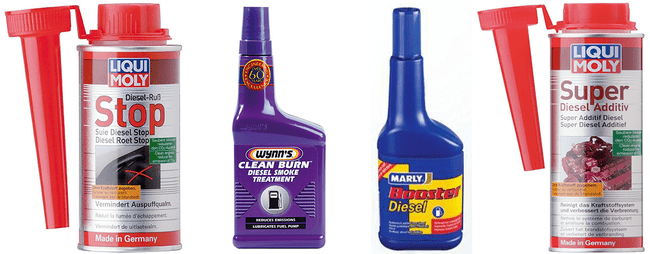
- Cleaning products.Dissolves the sediments in the engine injection system and in the catalytic converter, keeps them dissolved, prevents the formation of new sediments and helps to clean the exhaust gas recirculation valve. The most popular products in this category are Wynn Diesel Turbo Cleaner, Liqui Moly Diesel Spulung, BIZOL Dieselsystem Clean + d60, Motul Engine Cleaner and others.
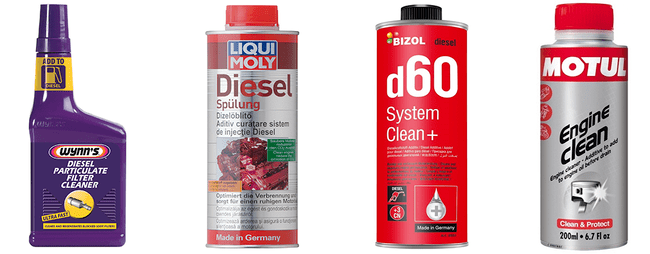
- Anti-wear. Improves the lubricating properties of the fuel. Prevents engine wear, increases efficiency and improves performance. It helps reduce fuel consumption and ensures quiet engine operation. An example of such a product is Liqui Moly Speed Diesel Additive and Liqui Moly Super Diesel Additive, MARLY CTi Diesel.
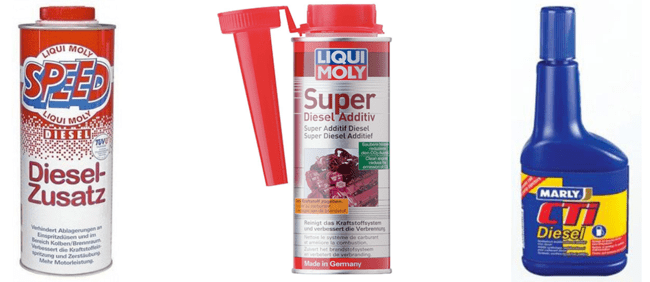
- Antifreeze.It improves the low-temperature properties of diesel fuel, prevents its thickening and clogging of the fuel filter and fuel line. The best known in this category is Dee-Zol Concentrate Diesel Treatment, Mannol Winter Diesel, Liqui Moly Diesel, Fliess-Fit and others.
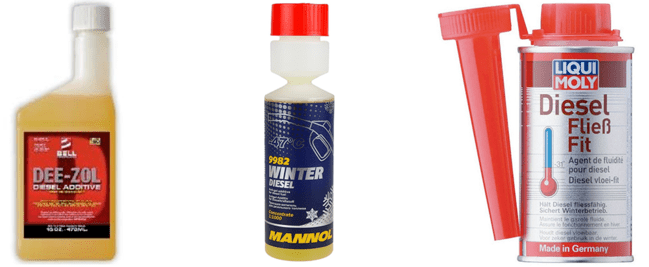
Coolant Additives
These additives are products for your cooling circuit. The most important standard additive is the antifreeze suitable for your vehicle engine and model. If this is missing, you quickly run the risk of your cooling circuit freezing in winter. This can cause significant consequential damage and also cause your vehicle engine to overheat very quickly in winter.
Another class of products that are often poured into the coolant are special sealants. So if you notice a gradual loss of coolant, it may be worth sealing the cooling circuit from the inside. To do this, simply add the appropriate product to your vehicle tank. This is then transported everywhere by the circulation pump and is able to find and seal slight leaks.
On the other hand, it may also be necessary to help your vehicle radiator to have a better flow. This means that dirt can easily settle in your cooling circuit, which impedes the coolant circuit. In such a case, you could try to eliminate the troublesome deposits with an additive. Alternatively, you also have the option of removing the air conditioning condenser and comprehensively checking its tightness and function. In this context, you also have the option of using our instructions and flushing your car radiator yourself.
Additives for engine and transmission oil
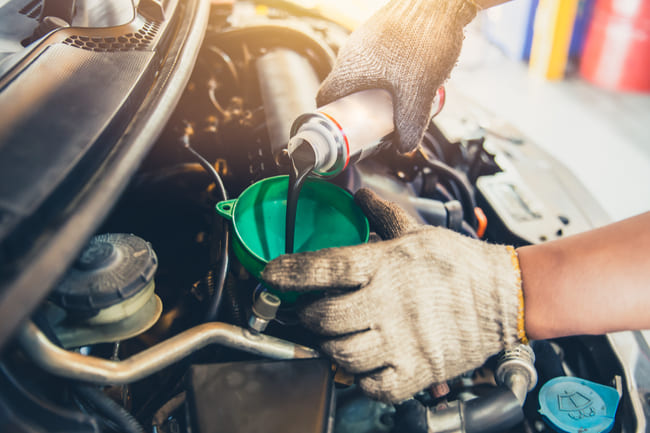
Especially high-quality, especially fully synthetic oils contain a whole range of additives. The production of these additives was adapted in such a way that the final oil products work particularly well. Gear and engine oils are basically there to lubricate important moving parts. This reduces their wear and tear. In addition, any abrasion particles are transported further so that they settle in the associated oil pan and cannot cause any further damage. The oils also ensure that the temperature is equalized as quickly as possible and that excess thermal energy is removed. The classic oil additives include: anti-corrosion agents, antioxidants, friction force reducers, viscosity improvers, antifoam agents, pour point reducers, detergents and dispersants. All additives mentioned here are of course also available as separately available products. This enables you to further improve the properties of the oil. In most cases, however, it is more worthwhile to use a high-quality motor oil instead of improving a cheap product with your own additives.
What advantages and disadvantages do additives offer?
The vehicle manufacturers usually make precise specifications as to which operating fluids are used and how often they have to be changed. If you stick to this, you will enjoy a significant increase in the life of your vehicle engine and many other systems. However, it's also important to remember that there can be some downsides to using the wrong additives. We therefore strongly recommend that you obtain comprehensive information before ordering and also using a specific product. This particularly applies to compatibility with your vehicle. The functions of the additives include protection against corrosion (especially rust), cleaning various vehicle systems, reducing fuel and engine oil consumption, as a lubricant and adapting to particularly low and particularly high outside temperatures.
Conclusion
The large number of additives for all possible working fluids in your car makes it difficult to keep track. These funds also cover a very wide range in terms of price. Many additives are also effective, but the question of cost-effectiveness often arises. If the additives have already been added during manufacturing, you can also assume that their use is worthwhile. This applies, for example, to the best motor oils. For all other real additives, you should think carefully about whether the financial outlay is actually worth it.
A tip from CarTipsandmore: When using additives, always keep in mind that these Products sometimes have a rather high price. In some cases, however, their use can be worthwhile. However, when it comes to fuel agents intended to protect the fuel filter and tank, it is advisable to only use them in certain exceptional cases. These situations include, for example, if you will not drive your vehicle for a long time or if it is a very old car or even a real vintage car.
